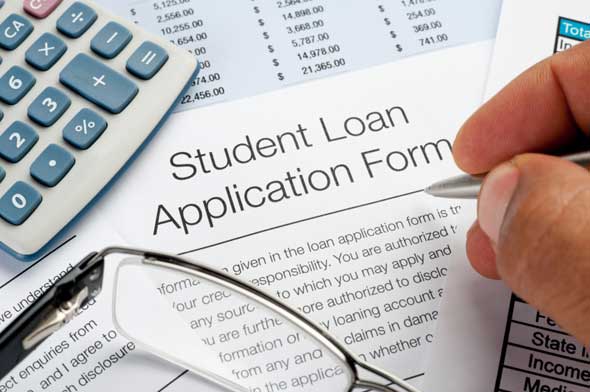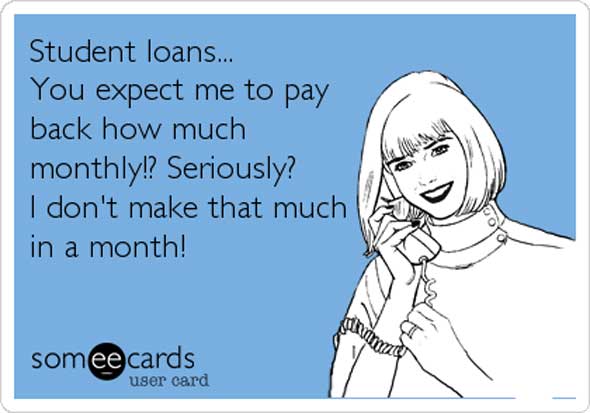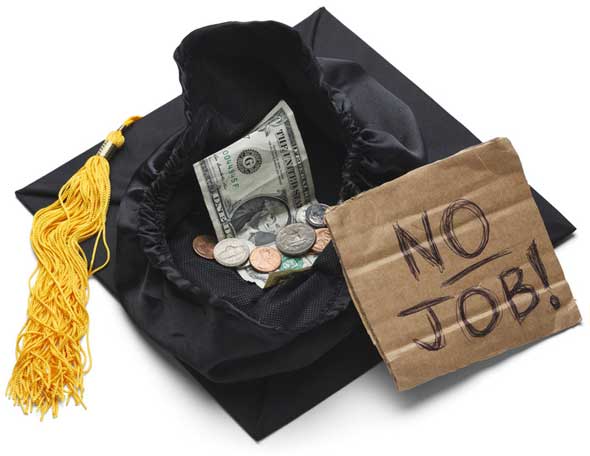COLLEGE SAVINGS 101

7 things you may not know about student loan repayment
http://www.savingforcollege.com/articles/7-things-you-may-not-know-about-student-loan-repayment-690
Posted: 2015-06-17
For many of us, taking out student loans has been or will be unavoidable in order to cover the costs of college. If youíre one of the 40 million Americans who currently have an outstanding student loan, here are 7 things you should know about how repayments work:

Photo credit: katield/someecards.com

1. The Six-month Grace Period
- After you leave school, your Federal Stafford Loans have a six-month grace period before you need to begin making payments.
- So if you just graduated in the Spring, you can rest easy this summer since your first payment wonít be due until the fall.
- Keep in mind that the grace period can begin anytime within 30 days of the day of your last class, so be sure to find out your exact payment due date.
Photo Credit: Can Stock Photo/belekekin

2. Regarding Default
- Delinquencies of at least 90 days will be reported to the three major credit bureaus and will negatively affect your credit score.
- If your bill is due monthly, default will occur after 270 days of missed payments.
- Consequences of default are severe and include:
- Wage garnishing
- Collections
- Loss of any eligibility for future federal student aid
- Withholding of federal and state tax refunds to collect the debt
Photo Credit: Can Stock Photo/focalpoint

3. Buying a Home
- In order to qualify for a mortgage, your debt-to-income ratio must be less than 43%.
- High student loan payments will increase your debt-to-income ratio and may hurt your chances of getting a home loan.
- Student Loan debt has been the cause of an 8% decline in home sales, according to research from John Burns Real Estate Consulting.
Photo Credit: Can Stock Photo/Feverpitched

4. Repayment Options for Federal Loans
- There are seven different types of repayment plans available for Direct Loans and Federal Family Education Loans (FFEL).
- With the Standard Repayment Plan, borrowers will pay the least amount of interest over the 10-year life of the loan.
- An Income-Based Repayment Plan is available for those with a partial financial hardship, where your payments will not exceed 15% of your discretionary income.
Photo Credit:iStock Photo/courtneyk

5. Repayment Options for Private Loans
- Borrowers will not have as many repayment choices with a private loan.
- The Consumer Financial Protection Bureau (CFPB) is the federal agency that can help you if you have disputes with your lender.
- The CFPB recently released a report based on 5,300 complaints filed against private lenders; many had to do with the lenderís failure to help avoid default.
Photo Credit: Linda E2469190/Someecards.com

6. Deferment/ Forbearance
- Borrowers who canít afford to make their monthly loan payments can consider deferment or forbearance to temporarily postpone or reduce them.
- During a period of deferment, you do not have to make any payments, and the federal government may even pay the interest on Federal Perkins, Direct Subsidized or Subsidized Federal Stafford Loans.
- Those who donít qualify for deferment can request forbearance, where you could be able to delay or reduce payments for up to 12 months.
Photo Credit: Can Stock Photo/PixelRobot

7. Student Loan Discounts
- The current interest rate for direct subsidized loans disbursed on or after July 1, 2014 through June 30, 2015 is 4.66%, but many lenders will offer a discount on your interest rate for things like signing up for automated payments.
- Generally, this discount is a 0.25 percentage point reduction Ė which can really add up over time for accounts with large balances.
- You may also be able to deduct up to $2,500 of qualified student loan interest from your tax return.
Photo Credit: Can Stock Photo/roxanabalint
Original Post: 2014-11-04, Updated: 2015-06-17
For many of us, taking out student loans has been or will be unavoidable in order to cover the costs of college. If youíre one of the 40 million Americans who currently have an outstanding student loan, here are 7 things you should know about how repayments work:

Photo credit: katield/someecards.com

1. The Six-month Grace Period
- After you leave school, your Federal Stafford Loans have a six-month grace period before you need to begin making payments.
- So if you just graduated in the Spring, you can rest easy this summer since your first payment wonít be due until the fall.
- Keep in mind that the grace period can begin anytime within 30 days of the day of your last class, so be sure to find out your exact payment due date.
Photo Credit: Can Stock Photo/belekekin

2. Regarding Default
- Delinquencies of at least 90 days will be reported to the three major credit bureaus and will negatively affect your credit score.
- If your bill is due monthly, default will occur after 270 days of missed payments.
- Consequences of default are severe and include:
- Wage garnishing
- Collections
- Loss of any eligibility for future federal student aid
- Withholding of federal and state tax refunds to collect the debt
Photo Credit: Can Stock Photo/focalpoint

3. Buying a Home
- In order to qualify for a mortgage, your debt-to-income ratio must be less than 43%.
- High student loan payments will increase your debt-to-income ratio and may hurt your chances of getting a home loan.
- Student Loan debt has been the cause of an 8% decline in home sales, according to research from John Burns Real Estate Consulting.
Photo Credit: Can Stock Photo/Feverpitched

4. Repayment Options for Federal Loans
- There are seven different types of repayment plans available for Direct Loans and Federal Family Education Loans (FFEL).
- With the Standard Repayment Plan, borrowers will pay the least amount of interest over the 10-year life of the loan.
- An Income-Based Repayment Plan is available for those with a partial financial hardship, where your payments will not exceed 15% of your discretionary income.
Photo Credit:iStock Photo/courtneyk

5. Repayment Options for Private Loans
- Borrowers will not have as many repayment choices with a private loan.
- The Consumer Financial Protection Bureau (CFPB) is the federal agency that can help you if you have disputes with your lender.
- The CFPB recently released a report based on 5,300 complaints filed against private lenders; many had to do with the lenderís failure to help avoid default.
Photo Credit: Linda E2469190/Someecards.com

6. Deferment/ Forbearance
- Borrowers who canít afford to make their monthly loan payments can consider deferment or forbearance to temporarily postpone or reduce them.
- During a period of deferment, you do not have to make any payments, and the federal government may even pay the interest on Federal Perkins, Direct Subsidized or Subsidized Federal Stafford Loans.
- Those who donít qualify for deferment can request forbearance, where you could be able to delay or reduce payments for up to 12 months.
Photo Credit: Can Stock Photo/PixelRobot

7. Student Loan Discounts
- The current interest rate for direct subsidized loans disbursed on or after July 1, 2014 through June 30, 2015 is 4.66%, but many lenders will offer a discount on your interest rate for things like signing up for automated payments.
- Generally, this discount is a 0.25 percentage point reduction Ė which can really add up over time for accounts with large balances.
- You may also be able to deduct up to $2,500 of qualified student loan interest from your tax return.
Photo Credit: Can Stock Photo/roxanabalint
Original Post: 2014-11-04, Updated: 2015-06-17
If you liked this post and think it would help others save for college, please share!
Recommended Articles
SPONSOR CONTENT
Financial Professionals
Top 529 College Savings Plans
One-year rankings are based on a plan's average investment returns over the last 12 months.
| State | Plan Name | |
|---|---|---|
| 1 | New Jersey | NJBEST 529 College Savings Plan |
| 2 | Nebraska | Bloomwell 529 Education Savings Plan |
| 3 | Nevada | USAA 529 Education Savings Plan |
Three-year rankings are based on a plan's average annual investment returns over the last three years.
| State | Plan Name | |
|---|---|---|
| 1 | New Jersey | NJBEST 529 College Savings Plan |
| 2 | South Dakota | CollegeAccess 529 (Direct-sold) |
| 3 | West Virginia | SMART529 WV Direct College Savings Plan |
Five-year rankings are based on a plan's average annual investment returns over the last five years
| State | Plan Name | |
|---|---|---|
| 1 | West Virginia | SMART529 WV Direct College Savings Plan |
| 2 | Indiana | Indiana529 Direct Savings Plan |
| 3 | Alaska | T. Rowe Price College Savings Plan |
10-year rankings are based on a plan's average annual investment returns over the last ten years.
| State | Plan Name | |
|---|---|---|
| 1 | West Virginia | SMART529 WV Direct College Savings Plan |
| 2 | South Carolina | Future Scholar 529 College Savings Plan (Direct-sold) |
| 3 | Alaska | T. Rowe Price College Savings Plan |
